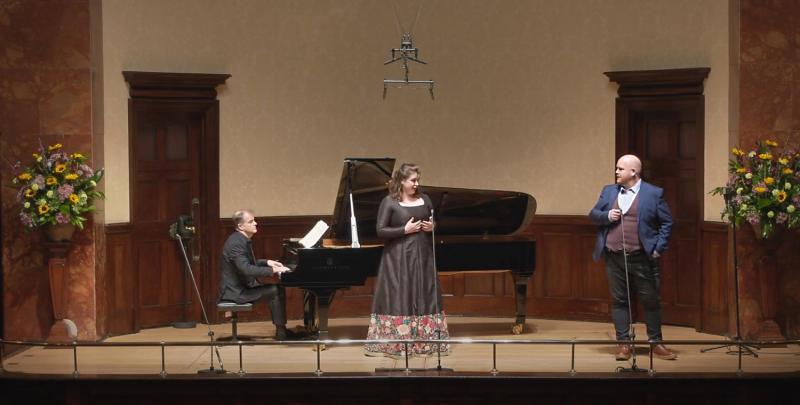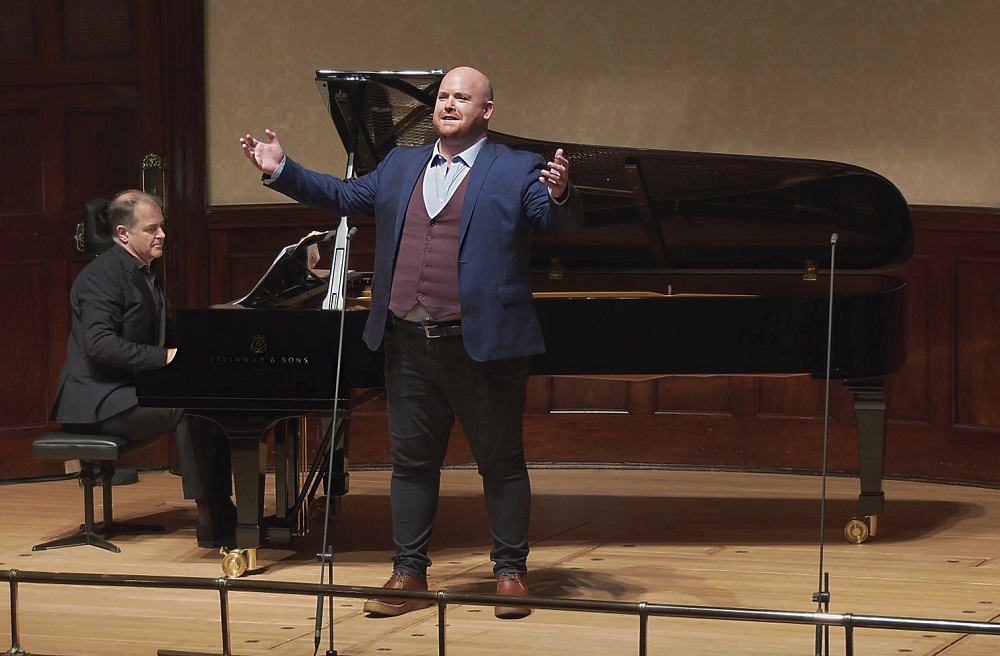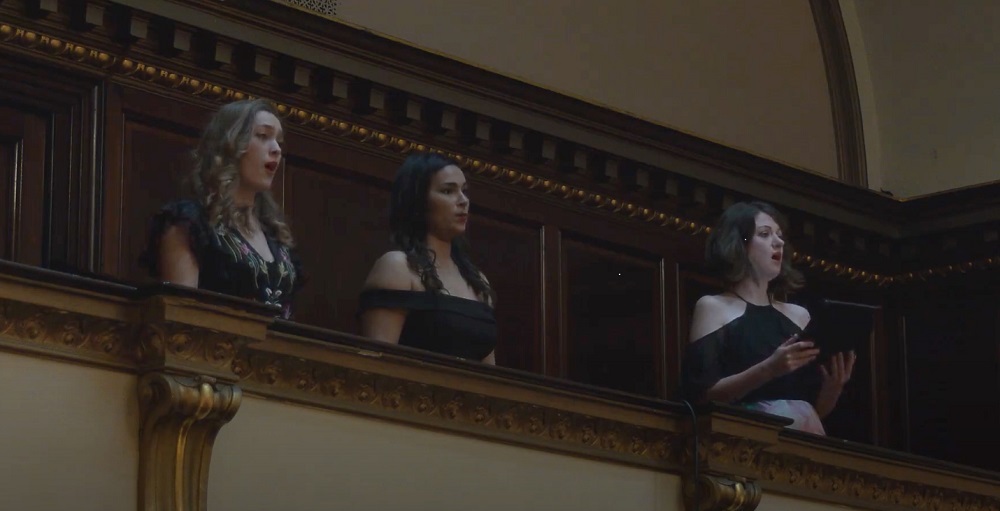Nicky Spence, Jess Dandy, Julius Drake, Wigmore Hall review – Moravian rhapsody | reviews, news & interviews
Nicky Spence, Jess Dandy, Julius Drake, Wigmore Hall review – Moravian rhapsody
Nicky Spence, Jess Dandy, Julius Drake, Wigmore Hall review – Moravian rhapsody
Janáček's gypsy passions warm up an empty hall

We don’t often see sultry come-to-bed moves in the Wigmore Hall, that chaste Parthenon of refined musical taste. But when Jess Dandy stretched out languidly on stage while offering to show Nicky Spence “how the gypsies sleep”, the temperature shot up even in an empty auditorium. In Janáček’s The Diary of One Who Disappeared, wildness and passion war with inhibition and conformity.
What kind of work is this vocal narrative, premiered a century ago (in 1921) and inspired – at least in part – by the Czech composer’s late-blooming love for Kamila Stösslova? “Song-cycle” doesn't quite fit the bill, given that the gypsy girl Zefka takes the stage herself, while the sturdy peasant lad Janek battles with his conflicted feelings. A trio of sopranos even chip in for a bit as a sort of village chorus. The Diary occupies a singular position, somewhere between a modern cantata and a chamber opera. At the Wigmore, tenor-of-the-hour Nicky Spence – whose recording of the work has justly won a Gramophone award – dialled up the spasmodic drama, ably supported by Dandy’s rich-hued mezzo as the bewitching Zigeunerin who teases and taunts through so many Mitteleuropäisch fantasies. This steamy encounter offers a third major character, however – the piano part that Janáček imbues with so much expressive vitality that it far surpasses mere “accompaniment”. Julius Drake, Spence’s partner on the recording as well, played it like a (torridly uneasy) dream.
As Janek, fully in character, Spence [pictured below] prowled the stage, hands often in pockets, a lovestruck ploughboy poleaxed by desire. Both his and Dandy’s pronunciation of the Czech sounded confidently idiomatic (so far as I could tell). Beefy yet stricken, Spence’s supersized voice enacted the internal combat that sets lust for this alien woman against the horror of betrayal and contamination. “My poor head aches, consumed with flames.” You bet it does.
 Massive in its middle range, utterly assured at the top, Spence also summoned a truly explosive quality from the chesty depths. This voice of a velvety grandeur can bloom and swell imperiously before shrinking into plaintive introspection. There’s a vein of scarcely-veiled violence in the writing, too, that he brought to the fore without neglecting poor Janek’s episodes of yearning tenderness and resignation (“That which fate has ordained cannot be avoided.”)
Massive in its middle range, utterly assured at the top, Spence also summoned a truly explosive quality from the chesty depths. This voice of a velvety grandeur can bloom and swell imperiously before shrinking into plaintive introspection. There’s a vein of scarcely-veiled violence in the writing, too, that he brought to the fore without neglecting poor Janek’s episodes of yearning tenderness and resignation (“That which fate has ordained cannot be avoided.”)
In her numbers, Dandy matched him for big-flavoured intensity, a proper diva more than a flirty minx, with her shame-free invitation to cross the ethnic lines: “Sit here closer to me… Or does my complexion alarm you?” Critics should never complain that voices are just too strong. But I did wonder what a pair of less heroic performers might have done with these roles; whether a folksy, lighter or rougher sound – something close to the cabaret-inspired works of the 1920s that the work sometimes resembles – might have uncovered other qualities. Still, both sang up a storm.
What the stolid rustic Janek can’t express by himself, the piano does: the keyboard acts almost as his unconscious. Drake spanned every one of its moods from discordant post-Wagnerian swoons to manic, jittery dances, with lyric rhapsodies that collapse into harmonic breakdowns. He deftly negotiated every quick-silver mood-change in the score – ominous drumming figures in the bass can suddenly yield to passages of Debussy-like enchantment high above. As for the central “erotic intermezzo” that interrupts the vocal numbers, it bristled with a spiky tension that took us far away from the pastoral delights of some late-Romantic wood. Meanwhile, the offstage maidens in the gallery – Ellie Neate, Leila Alexander and Catherine Backhouse [pictured below] – made their contribution with a nice blend of ethereal and earthbound tones: country angels with muddy boots.
 The mini-chorus returned for the songs that followed the Diary to fill the hour: seven items from Janáček's Moravian Folk Poetry in Song. Here, Spence and Dandy could relax and tear into lighter-spirited numbers that adopt rustic styles while always transforming them with a sharp, sly rhythmic or harmonic twist. They even took up drums and tambourines for “My Lover’s Horses”, while the show ended with the closing-time ensemble romp of “Musicians”. Tomorrow, Spence is shortlisted as Singer of the Year in the Royal Philharmonic Society awards. On this and other recent showings, he should give Lise Davidsen and Natalya Romaniw a very close contest.
The mini-chorus returned for the songs that followed the Diary to fill the hour: seven items from Janáček's Moravian Folk Poetry in Song. Here, Spence and Dandy could relax and tear into lighter-spirited numbers that adopt rustic styles while always transforming them with a sharp, sly rhythmic or harmonic twist. They even took up drums and tambourines for “My Lover’s Horses”, while the show ended with the closing-time ensemble romp of “Musicians”. Tomorrow, Spence is shortlisted as Singer of the Year in the Royal Philharmonic Society awards. On this and other recent showings, he should give Lise Davidsen and Natalya Romaniw a very close contest.
rating
Explore topics
Share this article
The future of Arts Journalism
You can stop theartsdesk.com closing!
We urgently need financing to survive. Our fundraising drive has thus far raised £49,000 but we need to reach £100,000 or we will be forced to close. Please contribute here: https://gofund.me/c3f6033d
And if you can forward this information to anyone who might assist, we’d be grateful.

Subscribe to theartsdesk.com
Thank you for continuing to read our work on theartsdesk.com. For unlimited access to every article in its entirety, including our archive of more than 15,000 pieces, we're asking for £5 per month or £40 per year. We feel it's a very good deal, and hope you do too.
To take a subscription now simply click here.
And if you're looking for that extra gift for a friend or family member, why not treat them to a theartsdesk.com gift subscription?
more Classical music
 Bizet in 150th anniversary year: rich and rare French offerings from Palazzetto Bru Zane
Specialists in French romantic music unveil a treasure trove both live and on disc
Bizet in 150th anniversary year: rich and rare French offerings from Palazzetto Bru Zane
Specialists in French romantic music unveil a treasure trove both live and on disc
 Scottish Chamber Orchestra, Ibragimova, Queen’s Hall, Edinburgh review - rarities, novelties and drumrolls
A pity the SCO didn't pick a better showcase for a shining guest artist
Scottish Chamber Orchestra, Ibragimova, Queen’s Hall, Edinburgh review - rarities, novelties and drumrolls
A pity the SCO didn't pick a better showcase for a shining guest artist
 Kilsby, Parkes, Sinfonia of London, Wilson, Barbican review - string things zing and sing in expert hands
British masterpieces for strings plus other-worldly tenor and horn - and a muscular rarity
Kilsby, Parkes, Sinfonia of London, Wilson, Barbican review - string things zing and sing in expert hands
British masterpieces for strings plus other-worldly tenor and horn - and a muscular rarity
 From Historical to Hip-Hop, Classically Black Music Festival, Kings Place review - a cluster of impressive stars for the future
From quasi-Mozartian elegance to the gritty humour of a kitchen inspection
From Historical to Hip-Hop, Classically Black Music Festival, Kings Place review - a cluster of impressive stars for the future
From quasi-Mozartian elegance to the gritty humour of a kitchen inspection
 Shibe, LSO, Adès, Barbican review - gaudy and glorious new music alongside serene Sibelius
Adès’s passion makes persuasive case for the music he loves, both new and old
Shibe, LSO, Adès, Barbican review - gaudy and glorious new music alongside serene Sibelius
Adès’s passion makes persuasive case for the music he loves, both new and old
 Anja Mittermüller, Richard Fu, Wigmore Hall review - a glorious hall debut
The Austrian mezzo shines - at the age of 22
Anja Mittermüller, Richard Fu, Wigmore Hall review - a glorious hall debut
The Austrian mezzo shines - at the age of 22
 First Person: clarinettist Oliver Pashley on the new horizons of The Hermes Experiment's latest album
Compositions by members of this unusual quartet feature for the first time
First Person: clarinettist Oliver Pashley on the new horizons of The Hermes Experiment's latest album
Compositions by members of this unusual quartet feature for the first time
 Gesualdo Passione, Les Arts Florissants, Amala Dior Company, Barbican review - inspired collaboration excavates the music's humanity
At times it was like watching an anarchic religious procession
Gesualdo Passione, Les Arts Florissants, Amala Dior Company, Barbican review - inspired collaboration excavates the music's humanity
At times it was like watching an anarchic religious procession
 Classical CDs: Camels, concrete and cabaret
An influential American composer's 90th birthday box, plus British piano concertos and a father-and-son duo
Classical CDs: Camels, concrete and cabaret
An influential American composer's 90th birthday box, plus British piano concertos and a father-and-son duo
 Cockerham, Manchester Camerata, Sheen, Martin Harris Centre, Manchester review - re-enacting the dawn of modernism
Two UK premieres added to three miniatures from a seminal event of January 1914
Cockerham, Manchester Camerata, Sheen, Martin Harris Centre, Manchester review - re-enacting the dawn of modernism
Two UK premieres added to three miniatures from a seminal event of January 1914
 Kempf, Brno Philharmonic, Davies, Bridgewater Hall, Manchester review - European tradition meets American jazz
Bouncing Czechs enjoy their Gershwin and Brubeck alongside Janáček and Dvořák
Kempf, Brno Philharmonic, Davies, Bridgewater Hall, Manchester review - European tradition meets American jazz
Bouncing Czechs enjoy their Gershwin and Brubeck alongside Janáček and Dvořák
 Solomon, OAE, Butt, QEH review - daft Biblical whitewashing with great choruses
Even a top soprano and mezzo can’t make this Handel paean wholly convincing
Solomon, OAE, Butt, QEH review - daft Biblical whitewashing with great choruses
Even a top soprano and mezzo can’t make this Handel paean wholly convincing

Add comment